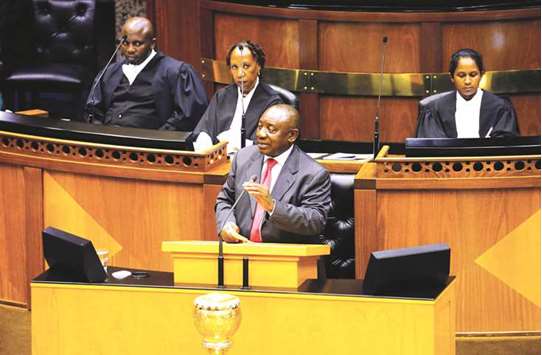“Issues to do with corruption, issues of how we can straighten out our state-owned enterprises and how we deal with ‘state capture’ are issues that are on our radar screen,” he told lawmakers in parliament.
“Those are issues we are going to be addressing and tomorrow we will also have an opportunity to outline some of the steps we are going to be taking,” said Ramaphosa, who got a standing ovation at the end of the speech.
Ramaphosa, a wealthy former businessman, will deliver his first State of the Nation address today.
South African lawmakers formally named Ramaphosa, the only candidate, as new president yesterday after scandal-tainted Zuma resigned under intense pressure from the ruling ANC party.
Zuma announced his resignation late Wednesday, and aimed barbs at the African National Congress (ANC) party for vowing to oust him via a no-confidence vote in parliament.
After he was announced as leader members of parliament broke into celebration, dancing and singing “Rise Ramaphosa.”
“South Africa must come first in everything we do,” Ramaphosa said in brief remarks afterwards.
“All of us should continue to improve the lives of our people.”
“I will work hard not to disappoint the people of South Africa,” he added.
The two main opposition parties, the Economic Freedom Fighters (EFF) and the Democratic Alliance (DA), both refused to vote for Ramaphosa, however, despite supporting Zuma’s early departure.
As parliament began to sit, EFF members became disruptive and eventually walked out.
EFF leader Julius Malema said Zuma was “headed to the dustbin of history,” but he noted Ramaphosa had been Zuma’s deputy.
The EFF has repeatedly criticised the millionaire businessman for his role in a deadly crackdown on striking mine workers several years ago.
DA leader Mmusi Maimane was also sceptical, telling parliament: “We don’t have a Jacob Zuma problem, we have an ANC problem.”
Many in South Africa hope that Ramaphosa, a trade-unionist turned-businessman, can turn the country around after endless corruption scandals that have diminished the popularity of Nelson Mandela’s ANC.
Among other things, Zuma is accused of allowing a wealthy Indian business family, the Guptas, to “capture the state” through lucrative business deals and possibly even by influencing ministerial appointments.
‘State capture’ refers to alleged corruption of state institutions and state-owned businesses by private individuals seeking illegal profits.
South African newspapers yesterday morning had welcomed the dawn of a new era after weeks of political crisis that saw Zuma refusing to step aside despite having lost the backing of his party.
“Finally! Zuma falls,” the headline of The Sowetan read. “Going Going Gone,” said The Star’s headline.
A cartoon in the Daily Maverick read: “End of an error.”
Ramaphosa faces many challenges.
Twenty-three years after the end of the racist, repressive apartheid regime, South Africa remains a country with enormous resources and great wealth but also vast inequality and poverty.
Though successive ANC governments have made huge efforts to build homes and supply basic services to millions of people, they have been unable to meet expectations.
Many people live without electricity or sanitation. Schooling and healthcare are often rudimentary.
One recent survey found eight out of 10 nine-year-olds in South Africa are functionally illiterate.
Levels of violent crime are among the highest in the world, with poor South Africans suffering most.
According to government statistics, the total number of people living with HIV increased from an estimated 4.72mn in 2002 to 7.03mn by 2016, though the rate of infection is declining.
Unemployment remains at an historic high of 27.7% across the general population, and as high as 68% among young people.
Economic growth has been limited in recent years, averaging little more than half the rate of population growth of 1.2%.
Zuma’s departure has sent the rand surging and will spur a rush of much-needed foreign investment.

